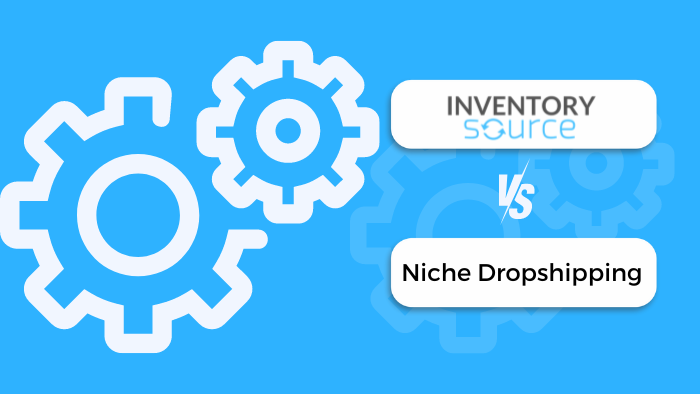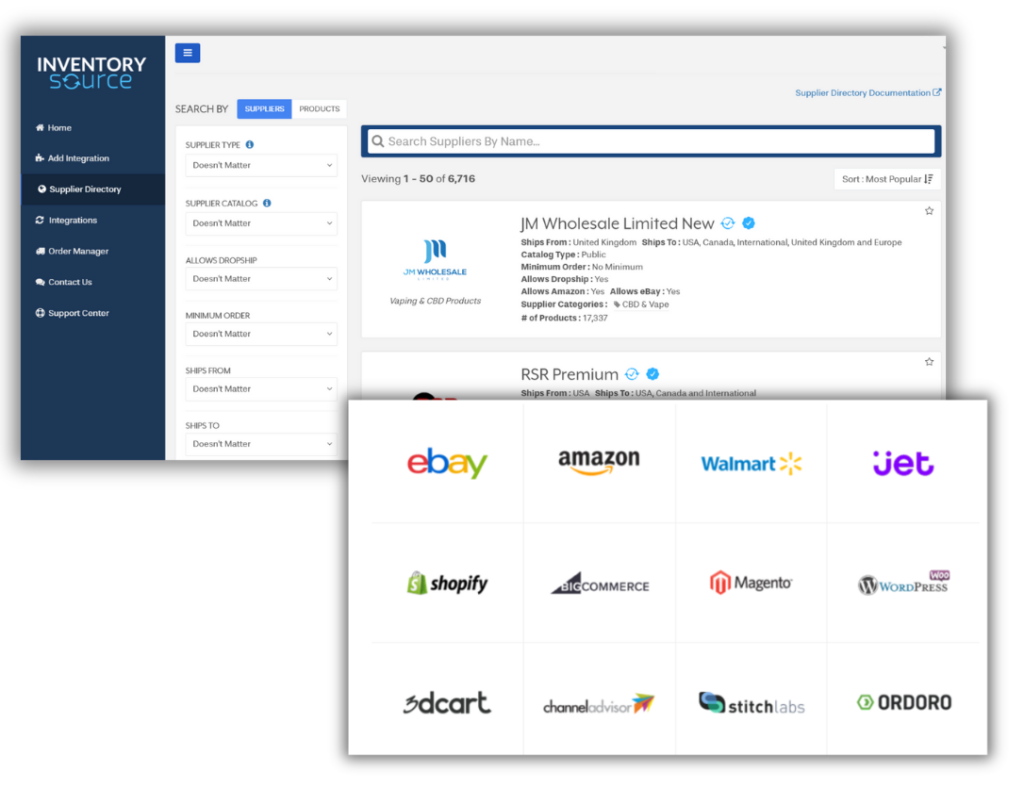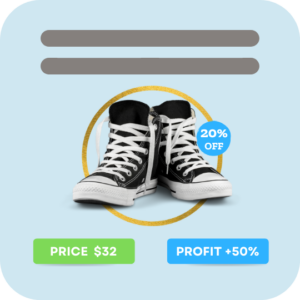Inventory Source vs Niche Dropshipping
Are you struggling with vast inventory and generic products? Discover the Best Dropshipping Solution! Compare Inventory Source vs Niche Dropshipping. Niche dropshipping unlocks targeted marketing, higher margins, and less competition. Inventory Source connects you to unique, in-demand products. Find the Perfect Fit for Your Business Needs. Explore Product Sourcing, Inventory Management, Pricing, and More. Stop managing stock, start curating your niche empire. Make Informed Decisions for Success!

Inventory Source - A Brief Overview
Inventory Source is for businesses aiming to make dropshipping easier and earn more money. It connects you with wholesale suppliers and provides many tools to make your dropshipping tasks simpler. Imagine having a huge list of dropship suppliers available in one convenient location. That’s exactly what Inventory Source offers you, saving you time and effort searching for trustworthy vendors. Once you’ve chosen your suppliers, Inventory Source automates uploading product details and images to your online store. No need for manual data entry anymore – Inventory Source handles everything!
However, Inventory Source goes beyond that. It maintains your product listings current by syncing them automatically with your suppliers’ inventory levels. This eliminates overselling and unhappy customers. Also, concerns about price changes are eliminated. Inventory Source ensures your listings always show the most recent pricing information, making your store competitive and profitable. Another valuable feature is the profit margin calculator. This handy tool helps you determine your potential earnings by factoring in product costs, shipping fees, and marketplace charges. With this information at your fingertips, you can make informed pricing decisions that maximize your profits.
Inventory Source integrates seamlessly with popular e-commerce platforms like Shopify and BigCommerce. This allows you to manage your entire dropshipping operation from one centralized location, saving you valuable time and effort. Whether you’re a seasoned dropshipper or just starting, Inventory Source offers a comprehensive set of tools to simplify your business and help you achieve dropshipping success.


Niche Dropshipping - A Brief Overview
Niche dropshipping is a business model where sellers focus on specialized products tailored to specific market segments. Unlike general stores, niche dropshippers target a narrow audience with unique needs and preferences. This approach allows them to offer highly curated product selections that cater to the interests of their target customers.
Niche dropshipping relies on identifying profitable niches with low competition and high demand, enabling sellers to establish themselves as authorities within their chosen market. By honing in on a particular niche, dropshippers can leverage their expertise to provide valuable solutions and build strong relationships with their customer base. This targeted approach often leads to higher conversion rates and increased customer loyalty. However, niche dropshipping also comes with challenges such as limited market size, seasonal demand fluctuations, and finding reliable suppliers for specialized products.
Despite these challenges, niche dropshipping offers the opportunity for sellers to carve out a profitable business in untapped markets and capitalize on the unique needs of niche audiences. With careful research, strategic planning, and dedication, niche dropshippers can create thriving businesses that cater to the specific desires of their target customers.
Features Comparison - Inventory Source vs Niche Dropshipping
Inventory Source and Niche Dropshipping are two popular solutions for businesses involved in ecommerce and dropshipping. Before going ahead with your selection for the right dropshipping partner, as a business owner, you should know the key feature comparison between Inventory Source and Niche Dropshipping.
The goal of this comparison is to assist you in grasping the main distinctions in product sourcing, inventory, and order management, pricing plans, extra features, user-friendliness, payment processing, supported platforms, and customer support between the two platforms. By examining these aspects, you can make a well-informed decision that aligns with your business requirements.
Features |  | |
|---|---|---|
| Product Sourcing | ||
| Inventory Management | ||
| Order Management | ||
| Pricing Plans | ||
| Other Features | ||
| Ease of Use | ||
| Payment Processing | ||
| Supported Platforms | ||
| Customer Support |
Pros and Cons of Inventory Source & Niche Dropshipping
Pros and Cons of Inventory Source
Inventory Source stands out as a dropshipping partner. They offer reliable suppliers, powerful automation tools, and top-notch features. While some drawbacks exist, the overall strengths outweigh them. Explore the pros and cons below to see if Inventory Source fuels your dropshipping success!
Pros
Supplier Library – Inventory Source cuts through the supplier search with a massive library across industries and niches. Find exactly what you need to sell.
Powerful Automation – Inventory Source takes the busywork out of dropshipping. Their automation handles tasks like inventory updates, order processing, and product syncing, freeing you up to focus on growing your business.
Multi-Store Management – Inventory Source streamlines multi-store management. Control everything from a single platform, ensuring your inventory and orders stay perfectly in sync across all your online stores.
Advanced Features – Inventory Source empowers businesses with advanced tools like customizable data feeds, real-time inventory sync, and automatic price updates. This translates to greater flexibility and control over your inventory management.
Scalability – Inventory Source is designed to scale businesses of all sizes, from small startups to large enterprises. Its scalable infrastructure ensures that businesses can easily expand their operations without encountering performance issues.
Profit Margin Calculator – Price with confidence! Inventory Source’s profit calculator factors in product cost, shipping, and marketplace fees to show your real profit margin. Make data-driven decisions and maximize your earnings!
Cons
Cost of Subscription – Using Inventory Source comes with a subscription fee, which is a factor to consider in your overall business expenses.
Integration Complexity – Inventory Source integrates seamlessly with most ecommerce platforms. However, some users with limited technical experience might require additional assistance during setup.
Limit to Customization – While Inventory Source offers a great dropshipping experience, businesses seeking extensive customization options might find its features a bit restrictive.
Inventory Source isn’t a one-size-fits-all solution, but for businesses looking to streamline dropshipping and maximize profits in a competitive market, it offers a powerful toolkit. Consider your needs and weigh the pros and cons to see if Inventory Source can be the key to unlocking your dropshipping success.
Pros and Cons of Niche Dropshipping
Niche Dropshipping offers a specialized approach to e-commerce, focusing on specific market segments rather than general products. This strategy can have both advantages and drawbacks, depending on your business goals and target audience.
Pros
Specialized Audience Targeting: Niche dropshipping allows for precise targeting of a specific audience interested in particular products, increasing the likelihood of conversion.
Reduced Competition: Operating in a niche market often means facing less competition compared to broader markets, providing greater opportunities for establishing a brand presence and securing loyal customers.
Higher Profit Margins: Niche products tend to command higher prices due to their unique appeal and perceived value, resulting in potentially higher profit margins for dropshippers.
Passionate Customer Base: Niche markets often attract passionate and engaged customers who are willing to invest in products they are passionate about, leading to increased customer loyalty and repeat purchases.
Brand Authority Building: Focusing on a niche allows dropshippers to position themselves as experts or authorities within that specific industry or product category, fostering trust and credibility among customers.
Cons
Limited Market Size: Niche markets typically have a smaller customer base compared to broader markets, potentially limiting growth opportunities for dropshipping businesses.
Product Availability Challenges: Finding reliable suppliers for niche products can be more challenging compared to mainstream products, leading to potential inventory and fulfillment issues.
Market Saturation Risk: Some niche markets may become saturated over time as more competitors enter the space, making it harder for dropshippers to stand out and capture market share.
Seasonal Demand Fluctuations: Niche products may experience fluctuations in demand based on seasonal trends or changing consumer preferences, requiring dropshippers to adapt their strategies accordingly.
Limited Product Range: Niche markets may offer a narrower range of products compared to broader markets, potentially limiting the variety of offerings available to customers and reducing cross-selling opportunities.
Niche dropshipping offers benefits like targeted marketing and potentially higher profits, but also comes with drawbacks like a limited market size and product availability. Weighing these pros and cons is essential for dropshippers to thrive in niche markets.
Inventory Source vs Niche Dropshipping FAQs
In terms of product variety, how do Inventory Source and niche dropshipping compare?
Inventory Source offers a wide range of products across multiple niches, while niche dropshipping specializes in specific product categories, providing a curated selection for targeted audiences.
Can both Inventory Source and niche dropshipping be integrated with popular ecommerce platforms?
Yes, both Inventory Source and niche dropshipping can be integrated with popular ecommerce platforms for seamless operation and management of online stores.
What kind of automation tools does Inventory Source offer, and how does it enhance the dropshipping process compared to a niche approach?
Inventory Source offers powerful automation tools like product uploads, inventory syncing, and order routing. These tools streamline operations, ensuring efficient management compared to manual processes in niche dropshipping.
Is there a significant difference in pricing models between Inventory Source and niche dropshipping?
Yes, Inventory Source offers subscription-based pricing plans, while Niche Dropshipping typically operates on a commission-based model, making a significant difference in their pricing structures.
For someone looking to start a new dropshipping business, which option provides better support and resources - Inventory Source or niche dropshipping?
Inventory Source offers more robust support and resources for starting a dropshipping business compared to Niche Dropshipping, making it a preferable choice for newcomers in the industry.
Do both options provide access to reliable suppliers, or does one have a more extensive network?
Both options offer access to reliable suppliers, but Inventory Source has a broader network, while Niche Dropshipping focuses on specialized suppliers within specific niches.